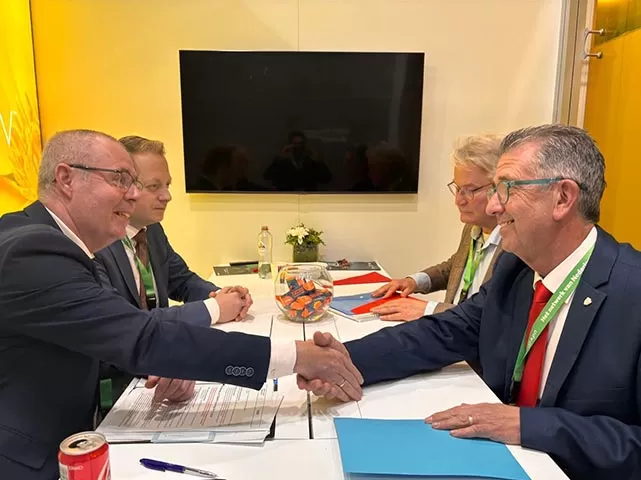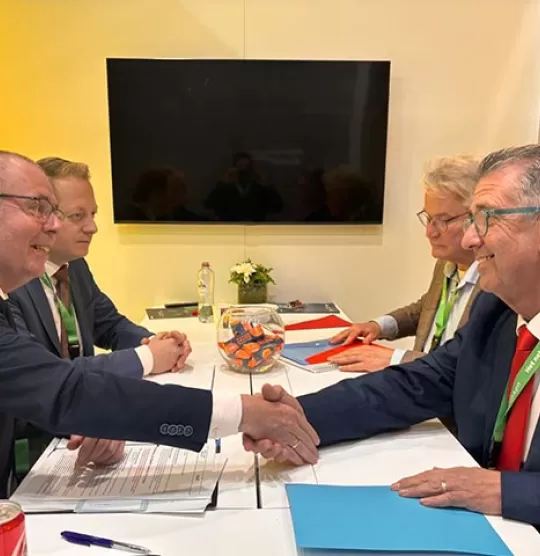
Global Partnerships, Local Impact
International industrial collaboration is an important part of Elbit Systems' strategy, in an era characterized by the growing need for local solutions and long-term partnerships.
In today’s interconnected world, where nations strive to strengthen their economies and defense capabilities, strategic industrial collaboration (IC) has shifted from a supporting role to an important pillar of business operations.
For Elbit Systems, this is more than a trend – it’s a one of our core strategies spearheaded by Adrian, Senior Vice President of Strategic Subcontracting and Industrial Collaboration at the company’s corporate headquarters. Under his leadership, Elbit Systems oversees billions of dollars in commitments, with contracts spanning years and requiring integration between global and local operations.
Turning Suppliers into Partners
A hallmark of Elbit Systems’ approach is its long-term, symbiotic relationships with suppliers. "Around 60 to 70 percent of the suppliers we work with are also our customers," Adrian explains. This unique dynamic fosters partnerships that go beyond conventional transactional models.
For example, when Elbit Systems supplies goods to an OEM, the collaboration becomes a two-way street. "If we cannot supply the goods, they might not be able to deliver the platform to their customers," Adrian notes, highlighting the mutual dependencies that underpin these strategic partnerships.
This approach mirrors a broader trend in which defense suppliers are expected to contribute to their customers’ local economies through IC or Offsets. Known by various terms worldwide – offsets, localization, or local content – these programs have become an important part of securing contracts awards.
"IC is now a business enabler for contract awards," Adrian states. In many cases, it accounts for up to 20 percent of the evaluation criteria when selecting suppliers. Companies that fail to meet IC requirements, regardless of their competitive pricing or products, risk losing bids.
A Shift Toward Localization
The increasing focus on localization arises also from global shifts. The COVID-19 pandemic exposed the vulnerabilities of over-reliance on global supply chains, which led to delays in supplying goods, halted manufacturing, and logistical chaos which increased essential costs and risks impact.
The war in Ukraine also heightened this focus, particularly in Europe, where defense industries faced challenges to meet increasing demand. Nations began prioritizing self-reliance by reducing external dependencies, particularly in critical sectors like defense.
"Countries are now demanding greater local production capabilities, not only to enhance national security but also to stimulate their economies and their independency," Adrian explains. This shift has introduced stricter localization requirements, often focused on knowledge transfer. "It’s not just about how you weld; it’s about enabling them to produce systems and subsystems such as radars, turrets, or even ammunition locally," he adds.
Elbit Systems plays a role in meeting these demands by establishing production lines, fostering investments, and transferring advanced technology – all aiming to be tailored to the specific needs and regulations of each country.
Multi-Year Strategies
Managing these complex partnerships demands meticulous planning and a deep understanding of global trends. Adrian spearheads this effort through corporate forums that unite representatives from all the company’s divisions. These forums analyze market dynamics, tackle challenges such as supply chain disruptions and embargoes, and develop tailored strategies to navigate the evolving landscape.
"Our goal is that potentially every strategy we develop aligns with the group’s long-term commitments and the specific needs of our partners," Adrian states. This holistic approach aims to ensure Elbit Systems remains a trusted global partner, consistently delivering on its promises while adapting to an ever-changing world.
A Niche That Demands Excellence
The realm of Industrial Collaboration is multifaceted, merging business acumen, technical expertise, legal insight, and entrepreneurial spirit.
Adrian underscores the importance of innovation within this field, both internally and externally. "It’s a niche you don’t learn in college; it’s a discipline honed through long practical experience," he explains.
As Industrial Collaboration gains prominence, Elbit Systems’ ability to forge meaningful partnerships and deliver exceptional results enhances its position as a leader in the global defense landscape.



